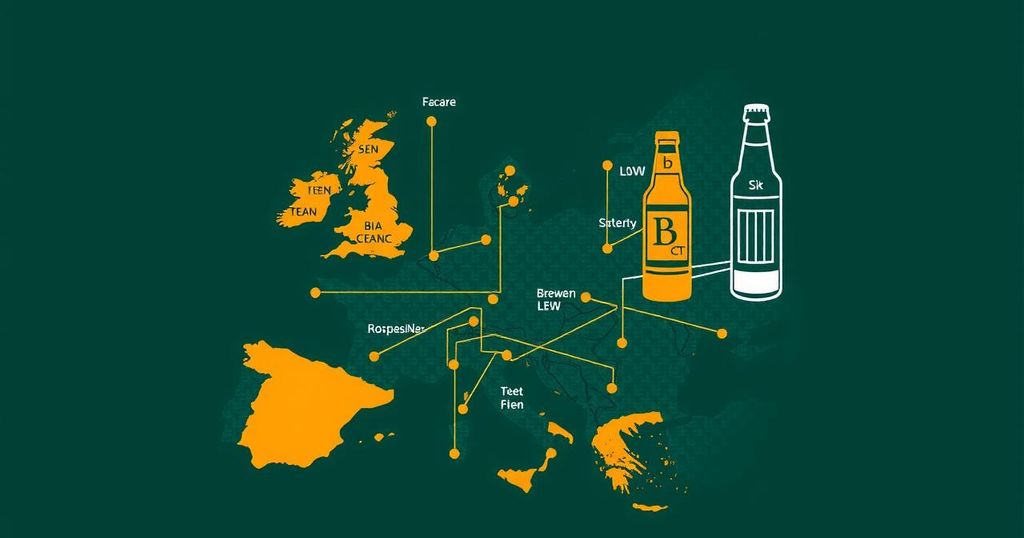The Independent Brewers of Europe (IBE) has been founded to defend the diversity of regional craft beers against the growing market power of large international brewing companies. This association comprises multiple national organizations from across Europe and aims to promote traditional brewing cultures while fostering fair competition. IBE seeks not only to protect the rich heritage of European beer but also to ensure consumers have access to a broader selection of flavorful products.
The recently established association known as “Independent Brewers of Europe” (IBE) aims to safeguard the rich diversity of traditional brewing cultures across Europe. In response to the increasing trend toward a homogenized global beer flavor, IBE seeks to promote and celebrate regional beer varieties. Hubert Stöhr, a key figure from the Independent Private Breweries of Austria, stated, “We have a common great goal. We want to protect the indigenous beer culture in all its diversity and enable its further development.” Comprising national organizations from various countries, the IBE has gained initial membership from associations in Germany, Finland, France, Italy, the Netherlands, Austria, Poland, Switzerland, the Czech Republic, and the United Kingdom. Together, these independent breweries aim to counteract the growing influence of large global beer corporations. “We want to cooperate across borders,” Stöhr emphasized, indicating ongoing discussions with additional European nations. The members of IBE believe that Europe possesses a vibrant beer culture, enriched over centuries and further enhanced by the recent craft beer movement. However, they perceive this heritage as increasingly threatened from market domination by a few international conglomerates. As Mike Benner, Managing Director of the Society of Independent Brewers and Associates in the UK, pointed out, “The dominance of corporate beers is palpable in all countries. We will be a voice for thousands of breweries, from individual countries to Brussels, where we have thus far received insufficient attention.” The goal of the IBE is not to engage in a direct conflict with these global players, but rather to foster fair competition, allowing consumers to choose from a wider array of flavorful products. Future cooperative measures will include regular exchanges among member countries to swiftly identify and respond to evolving market conditions and challenges. The founding associations include: – Germany: Private Brauereien Bayern – Finland: Pienpanimoliitto – France: Syndicat National des Brasseries Indépendantes (SNBi) – United Kingdom: Society of Independent Brewers and Associates (SIBA) – Italy: Unionbirrai – Netherlands: craftbrouwers.nl – Austria: Unabhängige Privatbrauereien Österreichs – Poland: Polish Craft Brewers Association (PSBR) – Switzerland: Die freien Schweizer Brauereien – Czech Republic: Czech and Moravian Microbreweries Association This collaboration hopes to ensure that the traditional brewing heritage of Europe flourishes despite the pressures from global brewing entities.
The formation of the Independent Brewers of Europe signifies a pivotal response to the challenges facing independent breweries in Europe, particularly due to the increasing globalization of the beer market, which tends to standardize flavors and diminish regional diversity. With a rich tapestry of brewing traditions, Europe faces the risk that this unique cultural heritage may be overshadowed by large multinational brewing companies. This initiative underscores the importance of preserving regional identities and promoting fair competition in the market, ultimately benefiting consumers and local economies.
The establishment of the Independent Brewers of Europe represents a concerted effort to protect and promote the diverse landscape of European brewing traditions. By uniting various national associations, IBE aims to combat the homogenization of beer culture perpetuated by major breweries, ensuring a vibrant marketplace for both independent brewers and discerning consumers. Their collaborative approach will help address market challenges while advocating for a greater recognition of craft breweries in the broader European context.
Original Source: www.meininger.de

Leave a Reply